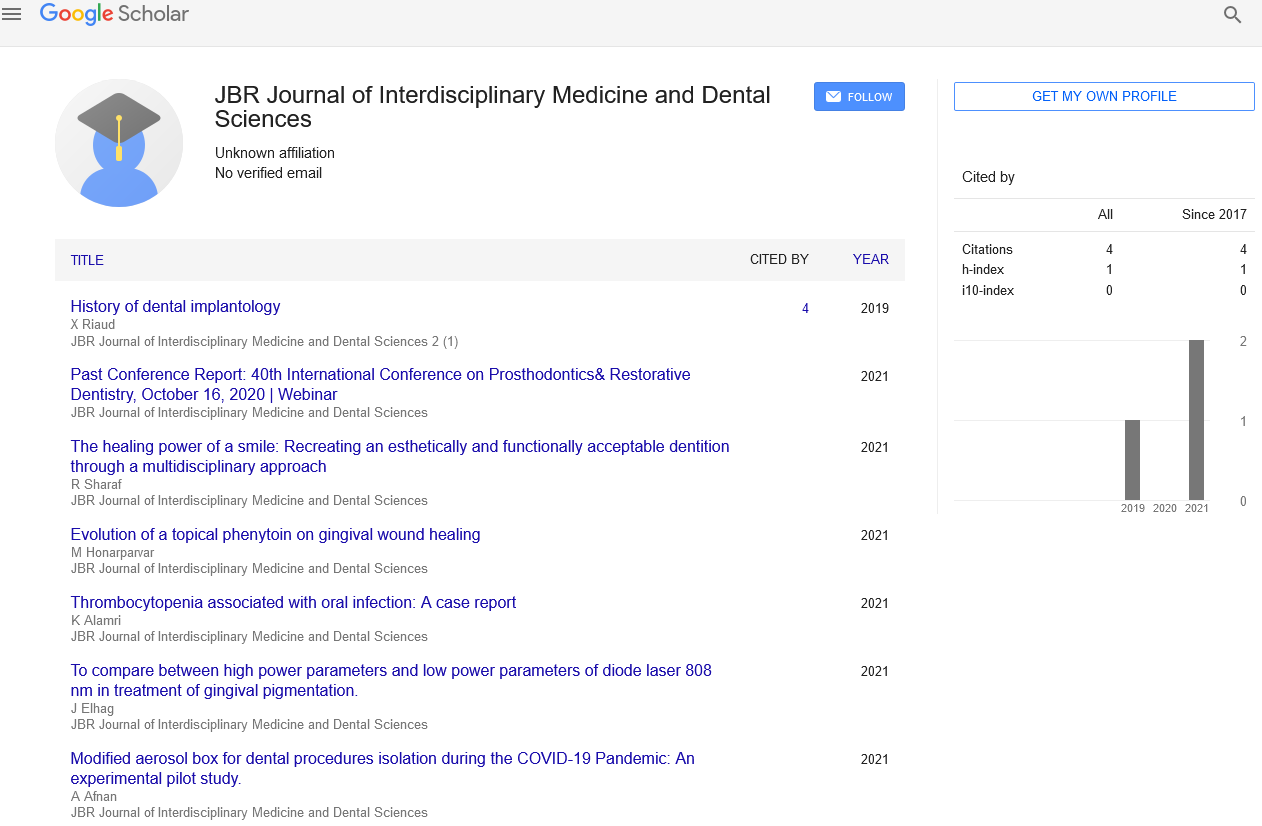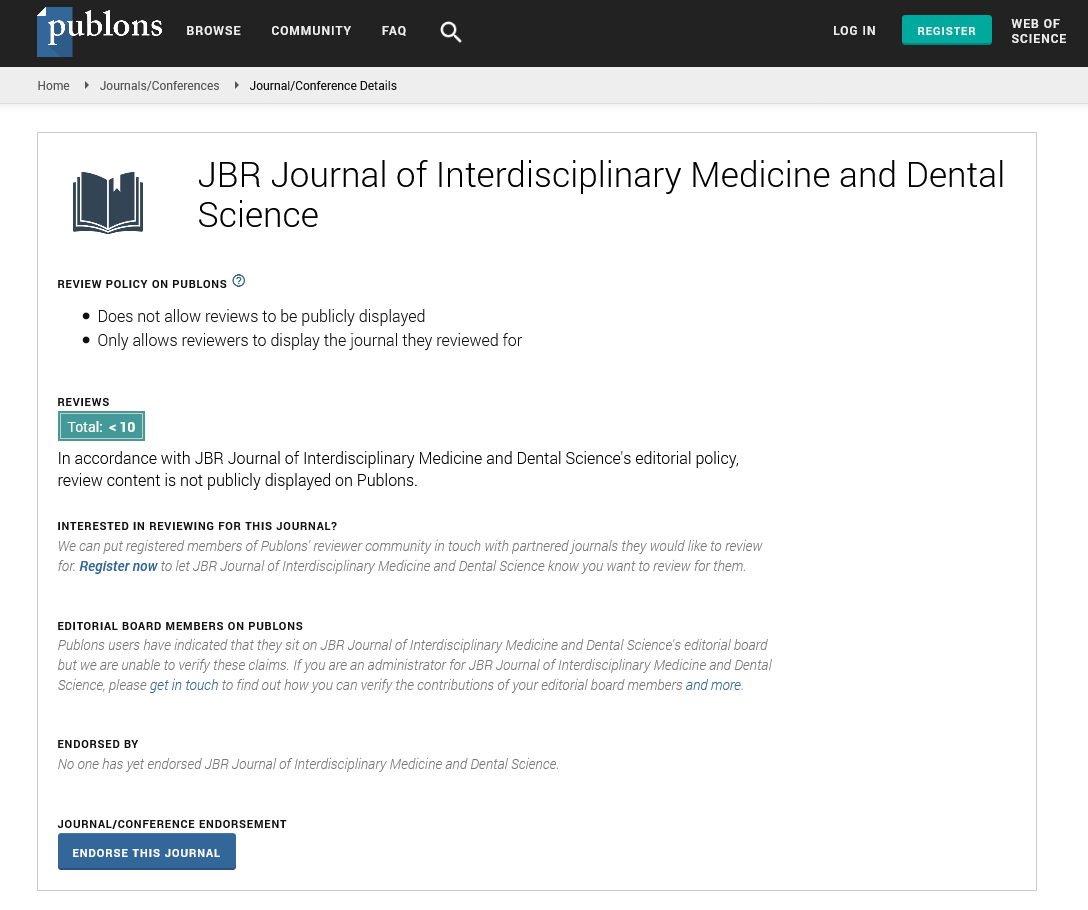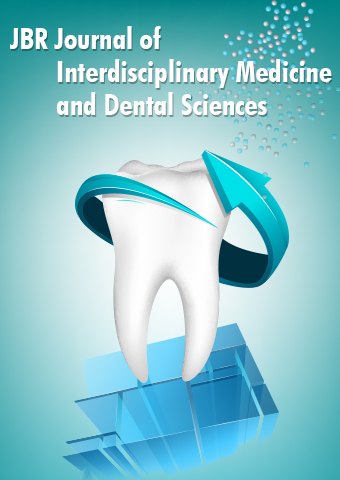Editorial - JBR Journal of Interdisciplinary Medicine and Dental Sciences (2023) Volume 6, Issue 3
The Power of Evidence-Based Medicine Advancing Healthcare through Science
Peter Tanaka*
Department of pharmacology, Japan
Department of pharmacology, Japan
E-mail: tanaka_ptr83@gmail.com
Received: 01-May-2023, Manuscript No. jimds-23-100154; Editor assigned: 04-May-2023, PreQC No. jimds-23-100154 (PQ); Reviewed: 18-May-2023, QC No. jimds-23-100154; Revised: 23-May-2023, Manuscript No. jimds-23-100154 (R); Published: 30-May-2023, DOI: 10.37532/2376- 032X.2023.6(3).58-61
Abstract
Evidence-based medicine (EBM) has emerged as a powerful approach to healthcare decision-making, integrating the best available scientific evidence, clinical expertise, and patient preferences. This article explores the concept of evidence-based medicine, highlighting its key components and benefits in advancing healthcare. By emphasizing high-quality research evidence, clinical expertise, and patient-centered care, EBM improves patient outcomes, enhances quality and safety, and promotes cost-effective healthcare. Despite challenges and limitations, evidence-based medicine continues to transform healthcare, driving innovation and optimizing patient care through the application of rigorous scientific methodology. The power of evidence-based medicine lies in its ability to bridge the gap between research and practice, ensuring that healthcare decisions are rooted in the most reliable and up-to-date evidence.
Keywords
Guidelines and protocols • Shared decision-making • Standardized care • Evidence-based medicine • Healthcare • Scientific evidence
Introduction
In the ever-evolving field of healthcare, the quest to provide the best possible care for patients remains paramount. However, determining what constitutes the “best care” can be a complex and multifaceted challenge [1]. This is where evidence-based medicine (EBM) emerges as a guiding principle, revolutionizing the way healthcare decisions are made. By integrating the best available scientific evidence, clinical expertise, and patient preferences, evidence-based medicine has the power to advance healthcare through the application of rigorous scientific methodology. Evidence-based medicine can be defined as an approach that combines the expertise of healthcare professionals with the most relevant and reliable research evidence to inform medical decisions. It recognizes the importance of using scientific evidence derived from well-designed studies to guide clinical practice [2]. This evidence includes systematic reviews, meta-analyses, and other types of studies that provide a solid foundation of knowledge. The core components of evidencebased medicine involve research evidence, clinical expertise, and patient preferences. Research evidence serves as the bedrock, providing a critical assessment of interventions, treatments, and diagnostic techniques. It encompasses the findings of systematic reviews, randomized controlled trials (RCTs), cohort studies, and case-control studies, among others. However, evidence-based medicine recognizes that research evidence alone is not sufficient to guide clinical decision-making [3]. Clinical expertise, garnered through years of training and experience, complements the research evidence. Healthcare professionals apply their knowledge, skills, and clinical judgment to interpret and contextualize the research findings, taking into account the unique circumstances of individual patients. This integration of clinical expertise ensures that evidence-based medicine is tailored to the specific needs and characteristics of each patient. In addition to research evidence and clinical expertise, evidence-based medicine places a strong emphasis on considering patient preferences and values. Recognizing that patients are active participants in their healthcare journey, evidence-based medicine promotes patient-centered care and shared decision-making. It involves engaging patients in conversations about their treatment options, providing them with information about the potential benefits and risks, and respecting their autonomy in making decisions that align with their values and preferences [4]. The power of evidence-based medicine lies in its ability to drive improvements in healthcare outcomes. By grounding medical decisionmaking in the best available evidence, evidence-based medicine enhances patient outcomes, improves the quality and safety of care, and promotes cost-effectiveness. It helps healthcare providers identify and implement interventions that have been shown to be effective while avoiding those that are ineffective or potentially harmful. By standardizing care through evidencebased guidelines and protocols, evidence-based medicine minimizes unwarranted variations in practice, reducing errors and adverse events. Furthermore, evidence-based medicine fosters the advancement of medical knowledge. By identifying gaps in knowledge and areas of uncertainty, it spurs further research and clinical trials, contributing to the growth and evolution of medical science [5]. The iterative process of evidence-based medicine ensures that medical knowledge is continuously refined and expanded, enabling healthcare professionals to provide the best possible care based on the most up-to-date evidence. While evidence-based medicine has transformed healthcare in remarkable ways, it is not without its challenges and limitations. Variability in research quality, the applicability of evidence to individual patients, and the accessibility of evidence in resource-limited settings are among the hurdles that need to be addressed. However, the principles of evidencebased medicine continue to shape the future of healthcare, facilitating the delivery of effective, efficient, and patient-centered care [6]. We delve into the concept of evidence-based medicine, explore its benefits, and examine its impact on healthcare. By examining the power of evidencebased medicine in advancing healthcare through science, we uncover how this approach is transforming the healthcare landscape, enhancing patient care, and driving continuous improvement in the field.
Discussion
In the realm of healthcare, the goal has always been to provide the best possible care to patients. However, determining what constitutes “best care” can be a complex and challenging task. This is where evidence-based medicine (EBM) emerges as a guiding principle, revolutionizing the way healthcare decisions are made. EBM combines the expertise of healthcare professionals with the best available scientific evidence, patient values, and clinical judgment. In this article, we explore the concept of evidence-based medicine, its importance, and how it is transforming the healthcare landscape.
What is evidence-based medicine?
Evidence-based medicine can be defined as an approach to healthcare that integrates the best available evidence from systematic research, clinical expertise, and patient preferences to inform medical decisions [7]. It emphasizes the importance of using scientific evidence derived from well-designed studies to guide clinical practice.
The key components of evidence-based medicine
Research evidence: EBM places a strong emphasis on high-quality research evidence. This includes systematic reviews and meta-analyses of randomized controlled trials (RCTs), which provide the highest level of evidence. Other types of studies, such as cohort studies and casecontrol studies, also contribute to the evidence base.
Clinical expertise: The expertise and experience of healthcare professionals play a crucial role in evidence-based medicine. Clinicians integrate their knowledge, skills, and clinical judgment to interpret and apply research evidence in the context of individual patients [8].
Patient preferences: EBM recognizes the importance of considering patients’ values, preferences, and unique circumstances when making medical decisions. Patient-centered care involves engaging patients in shared decisionmaking, providing them with information about the potential benefits and harms of different treatment options, and respecting their autonomy.
The benefits of evidence-based medicine
Improved patient outcomes: EBM aims to improve patient outcomes by providing healthcare providers with the most up-todate and reliable evidence. By integrating research evidence into clinical decision-making, healthcare professionals can identify effective interventions and avoid ineffective or harmful ones, leading to better patient outcomes [9].
Enhanced quality and safety: EBM promotes the use of evidence-based guidelines and protocols, which standardize care and reduce unwarranted variations in practice. This improves the overall quality and safety of healthcare delivery, minimizing errors and adverse events.
Cost-effectiveness: By focusing on interventions that have been shown to be effective, EBM can contribute to cost-effective healthcare. By avoiding unnecessary tests, treatments, and procedures, resources can be allocated more efficiently, benefiting both patients and healthcare systems. Advancement of Medical Knowledge: Evidence-based medicine drives research and innovation in healthcare [10]. It identifies areas of uncertainty or gaps in knowledge, prompting the need for further research and clinical trials. This iterative process allows medical knowledge to evolve and improve over time.
Challenges and limitations: While evidencebased medicine has transformed healthcare, it is not without its challenges and limitations. Some of these include:
Variability in research quality: The quality and reliability of research studies can vary, making it essential for healthcare professionals to critically appraise the evidence and consider the study design, sample size, and potential biases.
Applicability to individual patients: Research evidence provides general guidance, but individual patients may have unique circumstances or preferences that require tailoring of treatment decisions. Healthcare professionals must balance population-based evidence with individual patient characteristics.
Availability and accessibility of evidence: Access to high-quality research evidence can be a challenge, particularly for healthcare providers in resource-limited settings. Efforts are being made to improve the dissemination and accessibility of evidence-based resources.
Conclusion
Evidence-based medicine (EBM) has emerged as a powerful force in advancing healthcare through the integration of scientific evidence, clinical expertise, and patient preferences. By utilizing rigorous research methodology, EBM provides healthcare professionals with the means to make informed decisions that optimize patient outcomes, improve quality and safety, and promote cost-effectiveness. The application of evidence-based guidelines and protocols helps standardize care, reducing unwarranted variations and enhancing the overall delivery of healthcare services. Moreover, evidence-based medicine serves as a catalyst for the advancement of medical knowledge. By identifying gaps in current understanding and areas of uncertainty, EBM stimulates further research and innovation, driving the evolution of medical science. This iterative process ensures that healthcare providers are equipped with the most up-to-date information and evidence, enabling them to provide the best possible care to their patients. Despite the challenges and limitations that exist within evidence-based medicine, such as variability in research quality and the need to balance population-based evidence with individual patient considerations, its fundamental principles continue to shape the future of healthcare. The focus on patientcentered care and shared decision-making empowers patients to actively participate in their healthcare journey, promoting a collaborative approach between healthcare providers and patients. As evidence-based medicine continues to transform healthcare, it holds the potential to revolutionize the field further. By bridging the gap between research and practice, EBM has the capacity to drive continuous improvement, foster innovation, and ultimately elevate the overall standard of care. Through its emphasis on scientific evidence, clinical expertise, and patient preferences, evidence-based medicine stands as a cornerstone in advancing healthcare through the power of science. Evidencebased medicine represents a paradigm shift in healthcare decision-making, steering the field towards a more patient-centered, evidencedriven, and effective approach. By leveraging the best available evidence and integrating it with clinical expertise and patient values, evidencebased medicine propels healthcare forward, improving patient outcomes, enhancing quality and safety, and ultimately transforming the lives of individuals around the globe.
References
- Torre LA, Siegel RL, Ward EM et al. Global cancer incidence and mortality rates and trends--an update. Cancer Epidemiol Biomarkers Prev. 25, 16-27 (2016).
- Sankaranarayanan R. Screening for cancer in low- and middle-income countries. Ann Glob Health. 80, 412–417 (2014).
- Plummer M, de Martel C, Vignat J et al. Global burden of cancers attributable to infections in 2012: A synthetic analysis. Lancet Glob Health. 4, e609-e616 (2016).
- Bray F, Ferlay J, Soerjomataram I et al. Global cancer statistics 2018: GLOBOCAN estimates of incidence and mortality worldwide for 36 cancers in 185 countries. CA Cancer J Clin 68, 394-424 (2018).
- Danaei G, Vander Hoorn S, Lopez AD et al. Causes of cancer in the world: Comparative risk assessment of nine behavioural and environmental risk factors. Lancet. 366, 1784-1793 (2005).
- Forouzanfar MH, Alexander LT, Anderson HR et al. Global, regional, and national comparative risk assessment of 79 behavioural, environmental and occupational, and metabolic risks or clusters of risks in 188 countries, 1990-2013: A systematic analysis for the Global Burden of Disease Study 2013. Lancet. 386, 2287-2323 (2015).
- De Martel C, Ferlay J, Franceschi S et al. Global burden of cancers attributable to infections in 2008: A review and synthetic analysis. Lancet Oncol. 13, 607-615 (2012).
- Plummer M, Franceschi S, Vignat J et al. Global burden of gastric cancer attributable to Helicobacter pylori. Int J Cancer. 136, 487-490 (2015).
- Maucort Boulch D, de Martel C, Franceschi S et al. Fraction and incidence of liver cancer attributable to hepatitis B and C viruses worldwide. Int J Cancer. 142, 2471-2477 (2018).
- Andermann A, Blancquaert I, Beauchamp S et al. Revisiting Wilson and Jungner in the genomic age: A review of screening criteria over the past 40 years. Bull World Health Organ. 86, 317-319 (2008).
Indexed at, Crossref, Google Scholar
Indexed at, Crossref, Google Scholar
Indexed at, Crossref, Google Scholar
Indexed at, Crossref, Google Scholar
Indexed at, Crossref, Google Scholar
Indexed at, Crossref, Google Scholar
Indexed at, Crossref, Google Scholar
Indexed at, Crossref, Google Scholar
Indexed at, Crossref, Google Scholar


